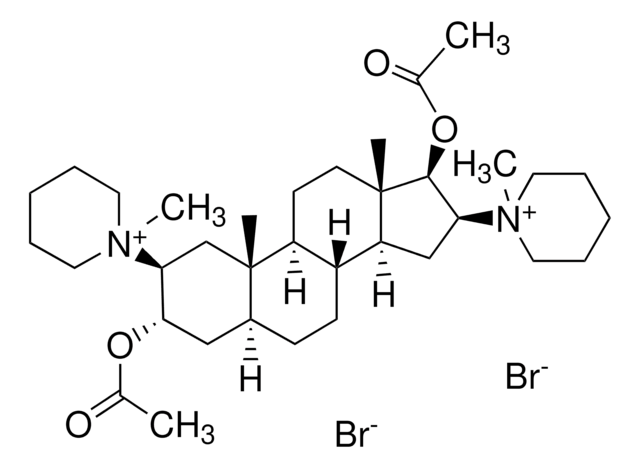N2001
Neostigmine bromide
≥98% (HPLC and titration), powder
Synonym(s):
3-(N,N-Dimethylcarbamoyloxy)-N,N,N,-trimethylanilinium bromide, Prostigmine
About This Item
Recommended Products
Quality Level
Assay
≥98% (HPLC and titration)
form
powder
color
white
mp
175-177 °C (lit.)
solubility
H2O: 1 g/mL
ethanol: soluble
SMILES string
[Br-].CN(C)C(=O)Oc1cccc(c1)[N+](C)(C)C
InChI
1S/C12H19N2O2.BrH/c1-13(2)12(15)16-11-8-6-7-10(9-11)14(3,4)5;/h6-9H,1-5H3;1H/q+1;/p-1
InChI key
LULNWZDBKTWDGK-UHFFFAOYSA-M
Gene Information
human ... ACHE(43)
Looking for similar products? Visit Product Comparison Guide
Application
- to control reaction specificity of acetylcholinesterase in coronal organ of Botryllus schlosseri.
- to study its effects on abnormal contraction of pyloric circular smooth muscle strips (PCSMS).
- to study its effects on depolarization of bag cell neurons.
Biochem/physiol Actions
Features and Benefits
Signal Word
Danger
Hazard Statements
Precautionary Statements
Hazard Classifications
Acute Tox. 1 Inhalation - Acute Tox. 2 Dermal - Acute Tox. 2 Oral - Eye Irrit. 2 - Resp. Sens. 1 - Skin Irrit. 2 - Skin Sens. 1 - STOT SE 3
Target Organs
Respiratory system
Storage Class Code
6.1A - Combustible acute toxic Cat. 1 and 2 / very toxic hazardous materials
WGK
WGK 3
Flash Point(F)
Not applicable
Flash Point(C)
Not applicable
Personal Protective Equipment
Certificates of Analysis (COA)
Search for Certificates of Analysis (COA) by entering the products Lot/Batch Number. Lot and Batch Numbers can be found on a product’s label following the words ‘Lot’ or ‘Batch’.
Already Own This Product?
Find documentation for the products that you have recently purchased in the Document Library.
Customers Also Viewed
Our team of scientists has experience in all areas of research including Life Science, Material Science, Chemical Synthesis, Chromatography, Analytical and many others.
Contact Technical Service











